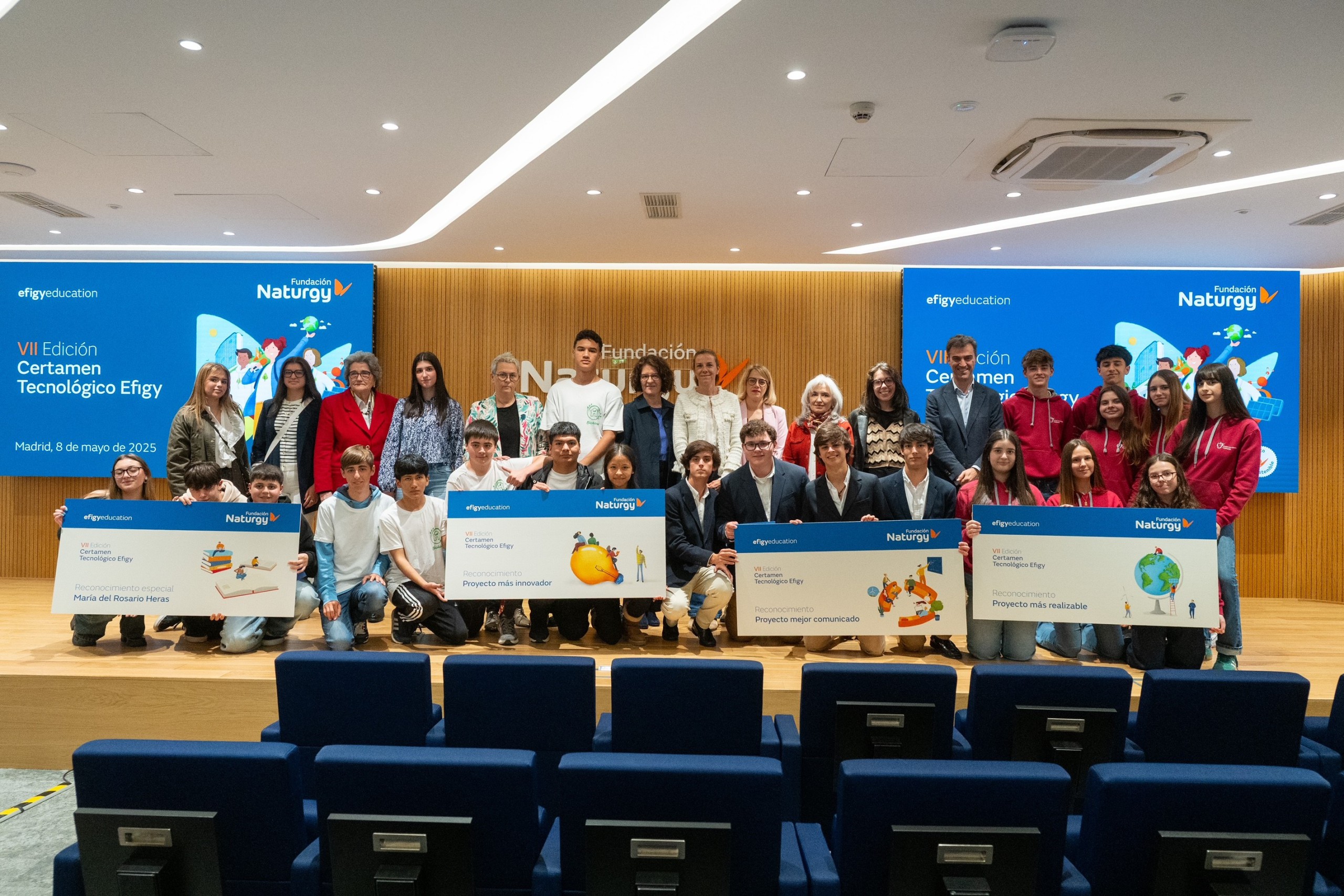Naturgy Foundation chooses the best school projects aimed at promoting energy efficiency from projects submitted by more than three thousand participating pupils
The seventh edition of the Efigy Technology Contest received a total of 97 projects from 34 schools from all over Spain.

The 7th edition of the Efigy Technology Contest today chose the winning projects from the ten semi-finalists at a ceremony held in Madrid:
- ‘Most achievable project’: BioWaste Energy from Colegio San Agustín (Calahorra), with a project to obtain biogas from alperujo waste in a small olive mill, to make sustainable and efficient use of olive oil production by-products to generate renewable energy, reduce operating costs and contribute to the environmental sustainability of the olive oil sector.
- ‘Best communicated project’: EnergyStep from Montecastelo School (Vigo), with a proposal to generate electricity in a sustainable way using the mechanical energy wasted when walking, by means of a piezoelectric tile that captures energy when pressed and released, and sends data generated to a web platform for real-time monitoring.
- ‘Most innovative project’: BIOhome from Institut Roquetes (Roquetes), which consists of including ecological and sustainable materials to improve environmental quality and limit the negative environmental impact of cities.
- ‘María del Rosario Heras Special Mention’: eNbotella2 from IES Cardenal Pardo Tavera (Toro), with a project that uses ecophysiological principles to provide a small-scale solution to climate change by improving air quality with a system of microalgae bioreactors that fix atmospheric carbon through photosynthesis.
In this edition, more than 3,000 students in 3rd and 4th year secondary education have participated in the Naturgy Foundation school content, which has received a total of 97 projects from 34 schools throughout Spain.
This initiative aims to promote the values of energy efficiency and encourage technological vocations from an early age, trying to motivate and generate awareness and interest in energy, reinforcing the research capacity of young people, awakening their curiosity and creativity, and facilitating teamwork and communication skills.
To take part in the competition, students had to find the solution to a challenge that would help improve the planet through energy efficiency. Projects submitted had to be linked to issues such as air quality in cities, energy efficiency, energy innovation for the Sustainable Development Goals, energy transition, new technologies and sustainable mobility, or energy consulting in vulnerable environments.
María Eugenia Coronado, general manager of the Naturgy Foundation, congratulated all participants for the creativity and applicability of all the projects submitted, highlighting “the quality of the proposals, as well as the dedication of students and teachers”. “The success of the Efigy Technological Contest lies in the efforts of the students who, each year, present innovative technological projects, which are so necessary to continue increasing energy efficiency and ensuring a just transition for all.” Coronado recalled that “the aim of this initiative is to create a learning environment that promotes access to specialised knowledge and the encouragement of technological vocations so that together we can guarantee a just energy transition and advance the sustainability of the planet.”
Recognition and award ceremony
The young participants of the ten semi-finalist projects met today in at Naturgy’s headquarters in Madrid to present their STEAM projects, giving them the opportunity to get closer to the professional world and offering them a space for dialogue in which to showcase their talent and recognise their contribution to the great challenges of the future.
The awards ceremony was conducted by motivational speaker Sergi Grimau and streamed to allow classmates, family and friends of the participating students to follow the ceremony live. The event was also attended by Irene Fernández-Mayoralas, Deputy Assistant Director of Centres and Programmes of the Ministry of Education, Vocational Training and Sport, by delegation of the Minister Pilar Alegría.
The three winning projects -Most Achievable Project, Best Communicated Project and Most Innovative Project were selected by the jury of experts who made their own professional and technical assessments. This year’s jury was made up of Judit Carreras, Director of the Institute for Just Transition of the Ministry for the Ecological Transition and the Demographic Challenge; Belén Gilarranz, Head of Institutional Relations of the Spanish Foundation for Science and Technology (FECYT); Pura Fernández, Vice-President for Scientific Culture and Citizen Science of the Spanish National Research Council (CSIC); Nuria Rodríguez, Director of Environment and Social Responsibility at Naturgy; and Manuel Calvo, Director of Energy and Environment at the Naturgy Foundation.
In addition to the three aforementioned awards, this seventh edition includes the María del Rosario Heras Special Mention, awarded by renowned doctor in Physics and Emeritus Researcher at the Centre for Energy, Environmental and Technological Research (CIEMAT).
Videos of the ten semi-finalist projects have also been submitted to a popular vote on Naturgy’s YouTube channel. The team with the most votes from the public on social media, Colegio Montecastelo (Vigo), has been considered a direct finalist in the final gala.
The Efigy Technology Contest in figures
This new edition marks seven years since the Naturgy Foundation launched the Efigy Technology Contest. During this time, more than 11,800 3rd and 4th year secondary students from 130 schools in 17 Autonomous Communities have taken part in the initiative. Around 400 energy efficiency projects have been assessed in total, which have aroused the interest of the social networks with more than 150,000 views.
The Efigy Technology Competition is part of the Efigy Education Programme, through which the Naturgy Foundation offers a wide range of training in the field of climate change and new energy technologies, with more than one million beneficiaries since 2018. This programme has the recognition and collaboration of leading institutions in the field of education and research, such as the Ministry of Education and Vocational Training, FECYT, ITJ and CSIC.
Share